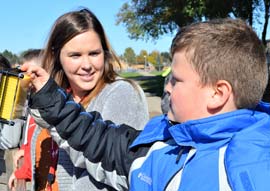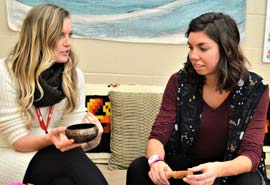Originally published December 28, 2018
School can be hard sometimes. While this may be true occasionally, it is especially true when a child or young person is already hurting. The death of a family member or classmate, a parent leaving home, bullying, or even the typical relationship problems with friends are just some of the issues that can interfere with academic achievement.
In the wake of several student deaths and serious issues in families, the Cedar Springs district is taking major steps to emphasize the mental health of its students, and has created an entire team of professionals to care for them.
Recently, the district hired a child life specialist as well as two child life interventionists, as part of the mental health team, whose goal is making sure that each student is always at his best mental state to perform academically.
“At the end of the day, we aim to decrease stress and increase coping skills for every student,” said Audra Holst, who started with the district as a Child Life Specialist at the beginning of the school year.
The position is unique to the field of public health and generally only available in hospital settings, where the specialist addresses emotional needs of sick children and children with sick family members.
“There are some (child life specialists) in schools, but I am not aware of any around here,” said Holst.

Completing the whole team approach
Adding a child life specialist has been on Cedar Springs radar for some time as the district is focused on providing a whole mental health team, according to district Director of Special Education and Student Services, Stacie Voskuil. “The child life specialist or interventionists are part of a bigger picture … of an interdisciplinary approach that we worked hard to attain.”
District Licensed Psychologist Dr. My Lien agrees. “This fills the gap where we needed more support with coping skills and prevention,” said Lien. “We have been there to help with crises, but this more on the prevention end.”
Having a psychologist on staff is another unique part of the district’s effort to address mental health. While many districts offer counseling services and lean heavily on support of KSSN staff, very few have a licensed doctor on the team, according to Lien.
“Our administration believes in order for kids to learn we must support their mental health needs.”
The addition of the three new staff positions ensures that every building in the district regularly houses at least one mental health provider, said Holst.

Every day, feelings are important
“There is still stigma behind any mental health services,” said Holst. “My goal is to have children recognize that everyone has negative feelings. And we are here to help them normalize those feelings.”
The interventionists spend time greeting children at lunch, at recess and in hallways. While sometimes they chat with them about their lives and feelings, they also introduce stress-relieving “toys.” They meet with individuals and with groups, teaching stress relieving techniques such as deep breathing and sometimes they supervise specific activities to allow students to get out anger.
The most important function of the interventionists is to make sure students know where they can find support whenever they feel they need it, according to Holst.
“We know there is research behind mindfulness in kids and when they are thinking about how to regulate their emotions, they can learn … coping skills,” said Holst. “Our biggest goal is to support emotional needs so they can be successful academically.”
To support this idea, Interventionist Megan Skinner, who primarily works at the middle school, had a vision to create a dedicated space for students to “take a break.” A room near the front office has been converted into what she calls the “Zen Den.”
The concept is that students can request a 15-minute time slot to focus on calming down or dealing with negative feelings. “Using the room … does wonders helping some students refocus before dealing with whatever the problem is,” said Skinner.
“My dream is that every building in the district will eventually have a positive environment with some mindfulness space,” said Holst. “Research shows that school suspensions and behavioral incidents decrease when space like this is available for students.”
The new staff members on the mental health team also include Interventionist Kaitlynn Mackie.
“This district has such a robust department, with social workers, KSSN, a psychiatrist, counselors, and now behavior interventionists. It is so unique for a school to have this many disciplines in the mental health field.” said Holst.
Related SNN articles:














